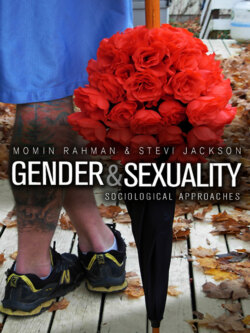Читать книгу Gender and Sexuality - Stevi Jackson - Страница 25
На сайте Литреса книга снята с продажи.
2.6 Marxist Feminism, Capitalism and Patriarchy
ОглавлениеWe have already mentioned Engels’ characterization of gendered divisions within the family as serving the needs of capitalism (see note 5), but it was his more famous collaborator, Marx, who is credited as a significant founding ‘father’ of sociology, and he had little to say on the issue of gender. Marxist feminism is best understood as a consequence of the range of engagements with Marxist theory that arose from the second wave of feminist politics and activism. While some tried to use Marxist analytical concepts to explain gender, and some attempted to further the initial spirit of Engels’ work and account for gender divisions as an effect of capitalism, others developed theories which positioned capitalism and the gender system – or patriarchy – as mutually reinforcing social systems (see Ch. 4)
Marxism and feminism (and subsequently gay and lesbian theories) have always had a problematic relationship, largely because of the difficulty of explaining gender and sexuality within a conceptual framework that was developed to account for the exploitation of industrialized, waged labour. Although some socialist feminists of the nineteenth and early twentieth centuries focused on the family as a social unit that reproduced and maintained male workers and argued for the need for women to engage in paid labour, in the vein of Engels’ analysis (Banks, 1990), most did not extend this critique to the rejection of marriage and domestic labour; rather they posited that socialism could transform such arrangements. Second wave feminism challenged this through developing the idea that a gendered system of domination – patriarchy – existed alongside but distinct from capitalism. The logical implication was that neither gender divisions nor the social ordering of sexuality could be understood as simply the consequence of capitalism but both must be seen as social systems of domination in themselves.
The resurgence of New Left politics across Britain, France and the USA in the 1960s heralded a re- engagement with Marxist theory and class struggle as a reaction both to the fact that the increasingly wealthy capitalist societies retained significant populations in poverty despite social welfare programmes, and to the fact that the state socialism of the USSR and its satellite countries had become increasingly totalitarian rather than liberating. There was, moreover, a rethinking of revolutionary politics as involving more than simply class struggle, producing a focus on racism, imperialism and anti- war protests and, most radically, sexual freedom. However, the politics of what came to be known as sexual ‘liberation’ often rested on the essentialist premise that capitalist social relations were ‘repressing’ a ‘natural’ human sexual potential by organizing it into rigid bourgeois structures of family and reproduction, and some liberal feminists and early gay theorists endorsed this view of capitalism’s consequences for gender and sexual relations.
One problem with traditional Marxist ideas of the material basis of social life is that they often led to a singular focus on the structures of the capitalist economy (who owns capital, who works for them, how this relationship is exploitative). This focus almost inevitably directed attention to the non- domestic realm, and largely thus to men. Marxist feminist ideas were therefore often developed in reaction to and in engagement with radical feminist ideas, particularly the concept of patriarchy. Heidi Hartmann (1981), in analysing the ‘unhappy marriage of Marxism and feminism’, develops a ‘dual systems’ approach, arguing that patriarchy has continued to coexist with capitalism, rather than having been superseded by it. Hartmann suggests that the main goal of Marxist feminism is to analyse the material basis for patriarchy in men’s (and not just capitalism’s) control over women’s labour.
In the attempts to develop Marxist feminism, some of those who identified as Marxist could also be seen as radical, in the sense that they accepted the radical feminist conceptualization of patriarchy and, in some cases, the importance of sexuality as a material reality of gender divisions, whilst at the same time remaining committed to retaining the materialist groundings of Marxist theory. This tension has often led to a characterization of these ideas as materialist feminism, signifying a broader interpretation of Marxism. A key example is Christine Delphy’s work on the exploitation of women’s labour in the family (1984; Delphy and Leonard, 1992), in which she argues that Marxist concepts and methodology could be applied to analysing exploitation within the domestic realm as a patriarchal mode of production (see Ch. 4.3). Monique Wittig has extended this analysis by directly confronting the institution of heterosexuality, challenging the individualization of women as ‘natural’ beings within traditional Marxism and arguing that women’s oppression had a material, and therefore social, basis:
For women to answer the question of the individual subject in materialist terms is first to show, as the lesbians and the feminists did, that supposedly ‘subjective’, ‘individual’, ‘private’ problems are in fact social problems, class problems; that sexuality is not for women an individual and subjective expression, but a social institution of violence. (Wittig, 1992: 19)
We will discuss the strengths and weaknesses of materialist and Marxist feminisms in chapters 4 and 5, but one of their most important contributions to second wave feminism has been an enduring concern with the broadly material (as economic) basis of gender divisions and inequality in capitalist societies. Furthermore, historical analyses have highlighted capitalism’s effects on the reordering of familial and gender relationships: for example, how property ownership was sustained through kinship and marriage (Kuhn, 1978), creating a new dominant bourgeois class who promoted the ‘domestic ideology’ of femininity (Hall, 1979). These relationships have helped to delineate the material basis of male domination, even though the parties to the ‘unhappy marriage’ of Marxism and feminism never resolved their differences over the relative priority to be given to patriarchy and capitalism.
